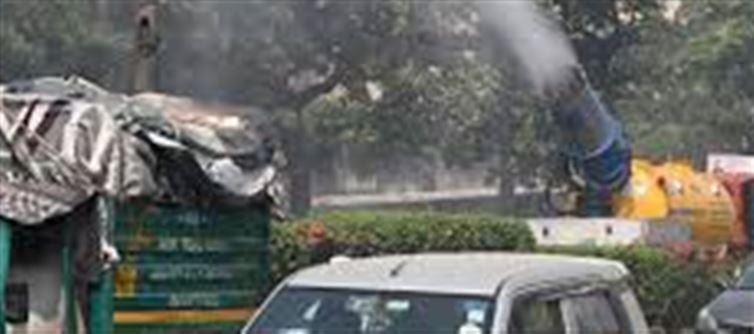
In a major move to tackle air pollution in the National capital Region (NCR), the Commission for air Quality Management (CAQM) has announced that non-Delhi registered BS-III and older commercial goods vehicles will be banned from entering Delhi starting November 1, 2025. This new policy aims to curb the worsening air quality in delhi and improve overall public health.
Here’s a detailed breakdown of the new ruling and what it means for residents and commercial vehicle operators.
1. What Is Being Banned?
Non-Delhi Registered BS-III and Below Commercial Vehicles:
The new rule targets commercial goods vehicles that are registered outside delhi and comply with BS-III emissions norms or older standards (BS-II, BS-I). These vehicles, which are often older models, produce high levels of pollutants that contribute significantly to air pollution in Delhi.
- BS-III and below: Refers to vehicles that don’t meet the latest BS-IV or BS-VI emissions standards, which are designed to reduce harmful exhaust emissions like nitrogen oxides (NOx) and particulate matter.
2. Why Is This Being Done?
Improving air Quality:
Delhi has been struggling with poor air quality for years, especially during the winter months when pollution levels peak due to a combination of weather conditions, vehicular emissions, and crop burning. By restricting older commercial vehicles from entering the city, the authorities aim to reduce toxic emissions and improve the overall air quality index (AQI).
- Vehicle emissions account for a major portion of air pollution, and these older, more polluting vehicles are often the largest contributors to smog and particulate matter in the air.
3. What Will Be the Impact?
Environmental Benefits:
The ban will help reduce air pollution by cutting down the number of older vehicles on Delhi’s roads. These vehicles release significantly higher amounts of carbon monoxide, NOx, and sulfur dioxide, which can have severe impacts on respiratory health and contribute to the city’s smog problem.
- The policy aims to meet the National Clean air Program (NCAP) goals, which focus on improving air quality in the NCR.
4. Who Will Be Affected?
Commercial Transporters:
- Truck operators and logistics companies with vehicles registered outside delhi that are BS-III or older will be directly impacted by the ban.
- Those who rely on cross-border trade or inter-state goods transport will need to plan alternative routes or consider upgrading their fleets to BS-IV or BS-VI standards.
Residents and Tourists:
- Public health will benefit, as the policy is expected to lower pollution levels, leading to cleaner air.
- Tourists and locals will also experience a reduction in noise and smog, improving overall quality of life.
5. Alternatives for Affected Parties
Fleet Upgradation:
For businesses affected by this ban, upgrading to BS-IV or BS-VI vehicles is an option. These vehicles are more efficient and eco-friendly, offering long-term savings in fuel costs and lower maintenance.
Enhanced Regulations for Entry:
Delhi is also ramping up the number of electrified and CNG-powered vehicles, which will have a reduced impact on the environment. Transport companies may want to consider shifting to electric or CNG trucks.
6. What About Enforcement?
Penalties for Violators:
The CAQM has also announced that violators of this new ban will face hefty fines and penalties. commercial vehicles found entering delhi without meeting the necessary standards will be fined and asked to return to their point of origin.
7. Long-term Goals:
Towards Sustainable Transport:
This is part of a larger effort to encourage the adoption of cleaner transportation and create a more sustainable environment in Delhi. The city will continue to focus on upgrading to BS-VI vehicles, expanding electric vehicle (EV) infrastructure, and promoting public transportation.
Cleaner Future:
Ultimately, the goal is to ensure that delhi becomes a model city for sustainable urban living, with less pollution and a higher standard of living for its citizens.
Final Thoughts:
This move is crucial for improving air quality in delhi, which has long been one of the most polluted cities in the world. By limiting the entry of older, highly-polluting vehicles, delhi is taking a significant step toward tackling air pollution and improving public health. While the ban will pose challenges for commercial vehicle operators, it’s an important decision that will benefit both the environment and residents in the long run.
As the city pushes for cleaner air, it’s clear that sustainability will play a central role in its future development.
Disclaimer:
The views and opinions expressed in this article are those of the author and do not necessarily reflect the official policy or position of any agency, organization, employer, or company. All information provided is for general informational purposes only. While every effort has been made to ensure accuracy, we make no representations or warranties of any kind, express or implied, about the completeness, reliability, or suitability of the information contained herein. Readers are advised to verify facts and seek professional advice where necessary. Any reliance placed on such information is strictly at the reader’s own risk..jpg)




 click and follow Indiaherald WhatsApp channel
click and follow Indiaherald WhatsApp channel